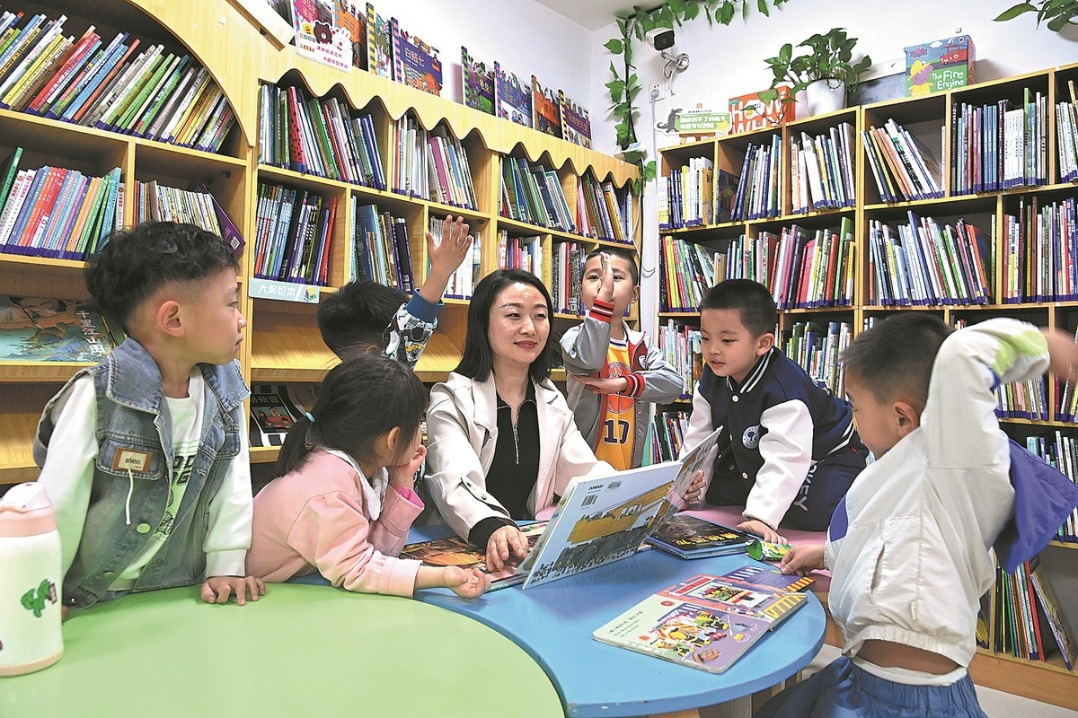China's gene therapy research making strides to restore sight for RP patients

BEIJING -- At 61, a retinitis pigmentosa (RP) patient surnamed Zhao has regained her independence after losing her vision, thanks to a groundbreaking gene therapy injection that, within months, restored her ability to cook, clean, and take walks with ease.
Before the treatment, RP had severely limited her sight to uncertain light perception, forcing her to rely mainly on touch to navigate her surroundings.
But a breakthrough by a team led by Luo Minmin, a professor at the Beijing-based Chinese Institute for Brain Research, has changed the trajectory of Zhao's life.
In 2022, the team serendipitously discovered the remarkable potential of opsin 5 (cOpn5), a unique photosensitive protein derived from chickens. This protein exhibited exceptional sensitivity to visible light, especially within the blue-green spectrum.
Capitalizing on this discovery, Luo's team developed an injectable solution using a recombinant adeno-associated virus (AAV) as a vector to carry the gene encoding this light-sensitive protein.
A single injection into the eye's vitreous cavity triggers the expression of this protein in retinal ganglion cells, restoring their light sensitivity and partially returning vision to patients.
"Preclinical studies revealed that ganglion cells expressing this novel photosensitive protein could be effectively activated by natural light," said Weng Danwei, R&D director at GenAns Biotech, the company that transformed Luo's research into the gene therapy drug GA001.
"This significantly reduces the need for assistive devices and lowers phototoxicity risks, providing a safer, more convenient treatment that helps patients reconnect with the world," Weng said.
In collaboration with GenAns Biotech, Beijing Tiantan Hospital recruited 15 volunteer patients, including Zhao, who joined the trial in May 2024.
The treatment is simple and straightforward. Doctors use a fine needle to inject the drug into the eye's vitreous cavity. The entire process takes less than half an hour, requiring no invasive surgery or implanted devices.
According to Zhao, her ability to perceive light significantly improved within a month, allowing her to distinguish larger objects like door frames and windows. By the second month, she could see smaller objects within a meter, such as fruits. Between three to six months, she had regained enough vision to live independently.
RP is a debilitating and hereditary condition that causes the gradual deterioration of retinal photoreceptor cells, leading to vision loss and, ultimately, blindness.
Weng noted that the condition affects approximately 1 in 4,000 people, indicating a significant market demand for GA001.
According to the China Association of Persons with Visual Disabilities, over 17 million people in China are visually impaired. As the population ages, the need for elderly care among blind individuals is becoming increasingly urgent.
At the 2025 Zhongguancun Forum Annual Conference, GA001 was recognized as one of the 10 major scientific and technological achievements in 2024 and is expected to progress to Phase I/II clinical trials by the end of 2025.
Scientists have long sought ways to restore vision. In 2017, the U.S. approved Luxturna, the world's first gene therapy for inherited retinal disease, marking a major milestone in ophthalmic treatment.
However, Weng said that Luxturna only targets one of the over 80 known gene mutations that cause RP, covering a mere 1 percent to 6 percent of RP patients, and only those in the early stages.
In contrast, GA001 stands out as a broad-spectrum therapy that is effective across various mutations and even for patients in late stages of the disease, she added.
In the realm of pharmaceuticals, innovative drugs are typically categorized as first-in-class, best-in-class, me-better, me-too and me-worse. Until recently, China's pharmaceutical industry has been dominated by me-too and me-better drugs. GA001 stands out as a pioneering first-in-class therapy.
In recent years, Beijing has significantly bolstered its support for innovative drugs. In April, the city announced 32 new initiatives to further fuel the sector's growth.
Weng believes that these policies will pave the way for accelerated clinical trials and faster market approval of innovative drugs.
Currently, GenAns Biotech is conducting investigator-initiated trials for several gene therapies, including GA001 for blindness, GA002 for refractory epilepsy, and GA008 for intractable pain, aiming to revolutionize the treatment of refractory central nervous system disorders and retinal diseases worldwide.
- The 2nd Shanghai International Light Festival to illuminate the city
- Guangxi school officials suspended over viral bullying incident
- Chinese scientists trace phased rise of oxygen that shaped Earth's habitability
- Ili River Third Bridge to open on Sept 30, will boost transport and trade
- Former senior political adviser charged with bribery
- New direct flight to link Beijing Daxing to Qatar's capital





































